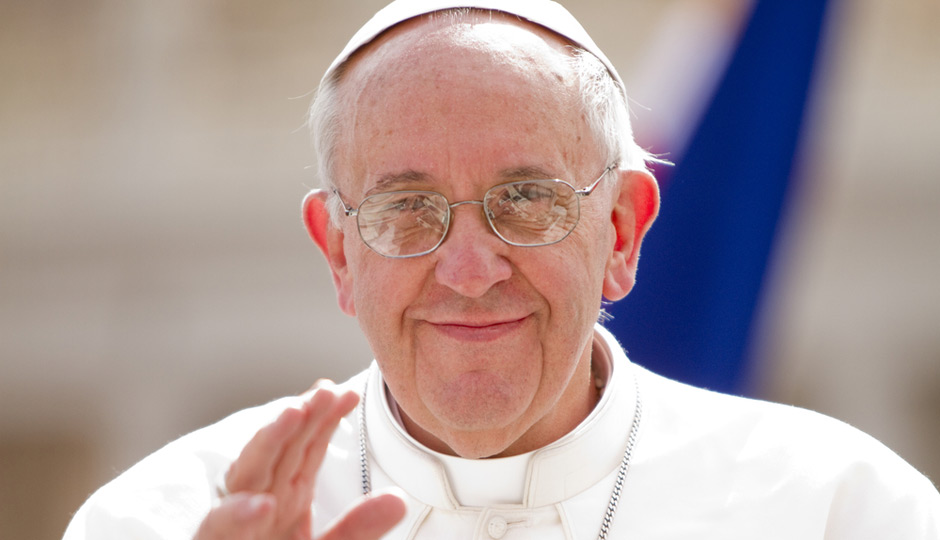Memo to the Tea Party: Jesus Was Not a Capitalist

Photo | Shutterstock.com
The publication late last month of Pope Francis‘s first papal exhortation – Evangelii Gaudium, or “Joy of the Gospels” – raised the hackles of some American conservatives, many of whom view the Pontiff’s call for universal justice and tolerance as ceding ground in the culture wars they have fought so hard to prosecute.
The hyperbole, which reached a crescendo over the Thanksgiving holiday, barely let up this week. Writing yesterday at Forbes.com, Louis Woodhill – who applies his own brand of “unconventional logic” to make laughably contrarian arguments like this one – exclaimed:
“While his great predecessor, Pope John Paul II, helped defeat a real tyranny, communism, Pope Francis has lent the prestige of the Catholic Church to leftist/socialist whining about the ‘new tyranny’ of ‘inequality, ‘exclusion,’ and ‘marginalization.’”
Jonathan Moseley, a Virginia Tea Party activist and contributor at WND.com, argued that since Jesus Christ was obviously a capitalist, he must now be “weeping in heaven” from the sting of his servant’s call for economic inclusiveness. And over at Breitbart.com, William Bigelow all but accused the Pope of willfully inciting a global revolution to install a new world socialist order.
Others, such as Catholic League President Bill Donohue – for whom parts of Evangelii Gaudium seem to have been personally drafted – are taking a different tack. Instead of rejecting the Pope’s message outright, Donohue’s been working overtime to “translate” it for befuddled progressives who obviously missed the point. When all else fails, he simply panders to the Pontiff’s uniquely “Latin American” take on the world’s economic problems and his “incomplete understanding” of the causes of economic inequality.
On the contrary, as a priest who spent decades of his life ministering to the poor in streets of his native Argentina, Pope Francis knows exactly what he’s talking about. And, while he’s not exactly turning church dogma on its head, his tenure as head of the Holy See represents a radical shift in Vatican policy from that of his two most recent predecessors – whose doctrinaire interpretations of religious practice required little real sacrifice from the faithful.
In his calls to believers to apply the principle of “Thou shalt not” to “an economy of exclusion and inequality,” and to care more about the homeless than their stock portfolios, Francis is challenging Christians to not only drop a coin or two in the poor box each week, but confront the structural forces that make poor boxes necessary. By admonishing the faithful to open their hearts and minds to people whose lifestyles they may not approve of, he’s rejecting the us-versus-them mentality of conservative believers who have learned to project their spirituality through the lens of partisan ideology.
For reactionaries on the right who have staked so much on politicizing religion, the notion of actually applying the Christian principles of universal love and acceptance was never part of the deal, and they’re not about to let a Latino priest with a penchant for washing feet tell them any different.
Yet, I doubt a failure to resonate with American radicals — wherever they may fall on the political spectrum — is causing the Pontiff to lose any sleep. Because his real message, I think, is not for people with the hubris to think they have it all figured out, but for those ambivalent Christians adrift in a world where the selfish materialism rejected by their savior is seen as the fuel of progress, and the most vocal religious voices are more than willing to cast the first stone in judgment against their fellow man.
Included in this group are the millions of Catholics who have abandoned the church over the past two decades, driven from the pews by sex scandals and a church bureaucracy that seems to care more about preventing women from getting birth control than making sure they have enough food to feed their children.
As one of them, I can attest that it is working. I’d need two hands to count the number of ex-Catholics I know who have developed a renewed interest in the church since Archbishop Jorge Mario Bergoglio became Pope Francis. That’s not to say all of them are rushing back to mass, but for the first time in many years, they feel there is a place for them there.
As a child, for years I watch my divorced mother remain seated while the rest of our congregation lined up for communion. With his statement that the Eucharist “is not a prize for the perfect but a powerful medicine and nourishment for the weak,” Pope Francis extended an olive branch to her and others like her, letting them know that a failed marriage does not make one unworthy of God’s medicine. The power of that message has been lost in all the talk about trickle-down economics and homosexuality, but it gets to the heart of Evangelii Gaudium.
“The Church is not a tollhouse,” the Pope writes. “It is the house of the Father, where there is a place for everyone, with all their problems.”
I think the people who need to hear that message are getting it. Those who refuse to hear it can rest assured that Francis, a Pope for all people, is praying for them.
Follow @cmoraff on Twitter.


